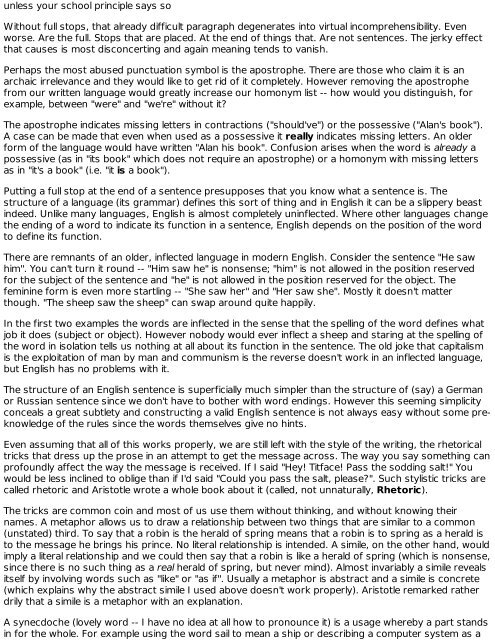Triffids Beard 2 - The Bearded Triffid
Triffids Beard 2 - The Bearded Triffid
Triffids Beard 2 - The Bearded Triffid
You also want an ePaper? Increase the reach of your titles
YUMPU automatically turns print PDFs into web optimized ePapers that Google loves.
unless your school principle says so<br />
Without full stops, that already difficult paragraph degenerates into virtual incomprehensibility. Even<br />
worse. Are the full. Stops that are placed. At the end of things that. Are not sentences. <strong>The</strong> jerky effect<br />
that causes is most disconcerting and again meaning tends to vanish.<br />
Perhaps the most abused punctuation symbol is the apostrophe. <strong>The</strong>re are those who claim it is an<br />
archaic irrelevance and they would like to get rid of it completely. However removing the apostrophe<br />
from our written language would greatly increase our homonym list -- how would you distinguish, for<br />
example, between "were" and "we're" without it?<br />
<strong>The</strong> apostrophe indicates missing letters in contractions ("should've") or the possessive ("Alan's book").<br />
A case can be made that even when used as a possessive it really indicates missing letters. An older<br />
form of the language would have written "Alan his book". Confusion arises when the word is already a<br />
possessive (as in "its book" which does not require an apostrophe) or a homonym with missing letters<br />
as in "it's a book" (i.e. "it is a book").<br />
Putting a full stop at the end of a sentence presupposes that you know what a sentence is. <strong>The</strong><br />
structure of a language (its grammar) defines this sort of thing and in English it can be a slippery beast<br />
indeed. Unlike many languages, English is almost completely uninflected. Where other languages change<br />
the ending of a word to indicate its function in a sentence, English depends on the position of the word<br />
to define its function.<br />
<strong>The</strong>re are remnants of an older, inflected language in modern English. Consider the sentence "He saw<br />
him". You can't turn it round -- "Him saw he" is nonsense; "him" is not allowed in the position reserved<br />
for the subject of the sentence and "he" is not allowed in the position reserved for the object. <strong>The</strong><br />
feminine form is even more startling -- "She saw her" and "Her saw she". Mostly it doesn't matter<br />
though. "<strong>The</strong> sheep saw the sheep" can swap around quite happily.<br />
In the first two examples the words are inflected in the sense that the spelling of the word defines what<br />
job it does (subject or object). However nobody would ever inflect a sheep and staring at the spelling of<br />
the word in isolation tells us nothing at all about its function in the sentence. <strong>The</strong> old joke that capitalism<br />
is the exploitation of man by man and communism is the reverse doesn't work in an inflected language,<br />
but English has no problems with it.<br />
<strong>The</strong> structure of an English sentence is superficially much simpler than the structure of (say) a German<br />
or Russian sentence since we don't have to bother with word endings. However this seeming simplicity<br />
conceals a great subtlety and constructing a valid English sentence is not always easy without some preknowledge<br />
of the rules since the words themselves give no hints.<br />
Even assuming that all of this works properly, we are still left with the style of the writing, the rhetorical<br />
tricks that dress up the prose in an attempt to get the message across. <strong>The</strong> way you say something can<br />
profoundly affect the way the message is received. If I said "Hey! Titface! Pass the sodding salt!" You<br />
would be less inclined to oblige than if I'd said "Could you pass the salt, please?". Such stylistic tricks are<br />
called rhetoric and Aristotle wrote a whole book about it (called, not unnaturally, Rhetoric).<br />
<strong>The</strong> tricks are common coin and most of us use them without thinking, and without knowing their<br />
names. A metaphor allows us to draw a relationship between two things that are similar to a common<br />
(unstated) third. To say that a robin is the herald of spring means that a robin is to spring as a herald is<br />
to the message he brings his prince. No literal relationship is intended. A simile, on the other hand, would<br />
imply a literal relationship and we could then say that a robin is like a herald of spring (which is nonsense,<br />
since there is no such thing as a real herald of spring, but never mind). Almost invariably a simile reveals<br />
itself by involving words such as "like" or "as if". Usually a metaphor is abstract and a simile is concrete<br />
(which explains why the abstract simile I used above doesn't work properly). Aristotle remarked rather<br />
drily that a simile is a metaphor with an explanation.<br />
A synecdoche (lovely word -- I have no idea at all how to pronounce it) is a usage whereby a part stands<br />
in for the whole. For example using the word sail to mean a ship or describing a computer system as a


